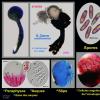
05-03-2026 10:07
Hulda Caroline HolteHello, I found and collected this species growing

05-03-2026 16:30
François BartholomeeusenDear forum members, On the 2nd of February 2026,

19-02-2026 17:49
Salvador Emilio JoseHola buenas tardes!! Necesito ayuda para la ident

03-03-2026 20:34
 Miguel Ángel Ribes
Miguel Ángel Ribes
Good eveningThese small, amphora-shaped perithecia

01-03-2026 18:02
 Francois Guay
Francois Guay
I found this mystery Helotiales on an incubated le

28-02-2026 14:43
A new refrence desired :Svanidze, T.V. (1984) Novy

01-03-2026 18:46
 Robin Isaksson
Robin Isaksson
Hi! This species i se from time to time in the
Asco inconnu
Roland Labbé,
18-02-2009 21:54
Voici une planche d'un Asco qui m'est ocmplètement inconnu, possiblement un Plectomycète ?
Merci de bien vouloir me renseigner sur l'espèce en question.
Détails :
Date de récolte: 2009 / 02 / 17
Substrat : culture intérieure sur bûche décomposée d’érable rouge, possiblement sur très vieux Hypoxylon ?
Sporée absente
Cleisthothèce probable porté par un pied ?
Spores cylindriques, lisses, avec 2 grosses guttules polaires, apparemment non septées, possiblement avec un étranglement central à maturité, 10-12 x 3 µm, 10,6 x 3 µm en moyenne (10 spores), Q = 3,53
Asques à 8 spores bisériées, avec appareil apical non amyloïde, 50-65 x 6-8 µm
Paraphyses longuement fusoïdes-lancéolées, à paroi très mince difficile à observer, possiblement septées vers la base, hyalines, dépassant les asques de ± 30 µm
David Malloch,
19-02-2009 02:22

Re:Asco inconnu
This looks like a perithecium of one of the Diaporthaceae. The apparent stalk may be a long perithecial neck like in species of Gnomonia. The asci do not look like they belong to a plectomycete because they are elongated and appear capable of forcible spore discharge. Is it possible that the perithecium was removed from a stromatic group as in Cryptodiaporthe?
